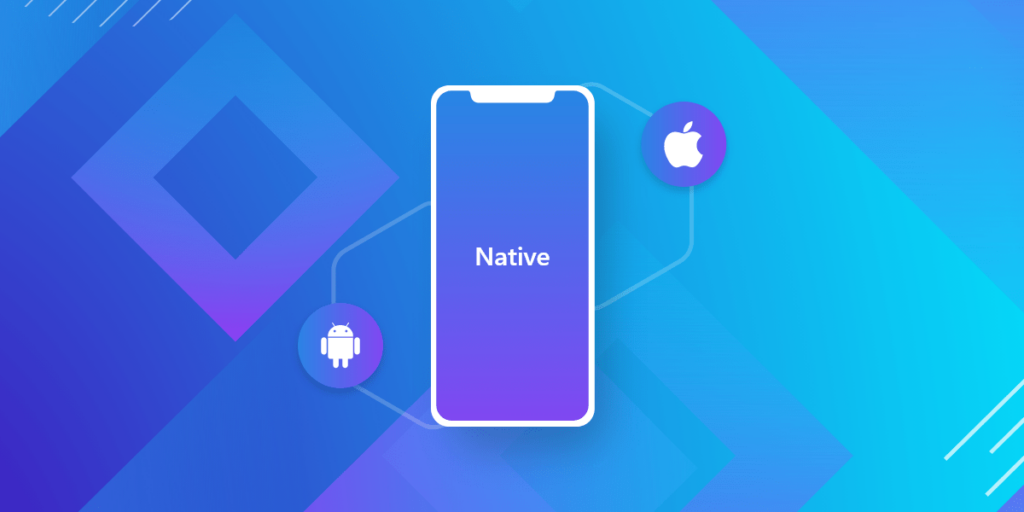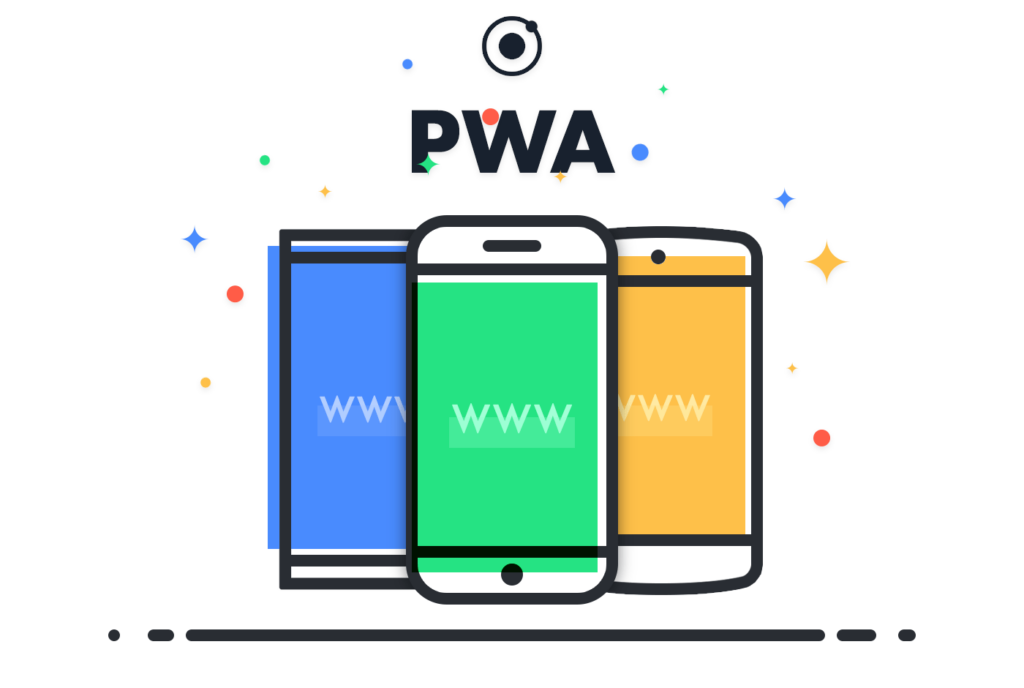Mobile applications are an essential component of a company and are widely used to communicate, instruct and advertise the products and services you offer to your targetted customer. Previously, businesses used to create their apps for various platforms like iOs, Android, and Windows using Native apps.
Then, progressive web apps entered the app development market and started evolving rapidly. Questions like will it take over the native apps? Who will win the battle: PWA vs Native App? And many more arouse in the mind of developers and businesses.
What is Native App?

An app that is exclusively designed for one single operating system like iOs or Android is known as a native app. The Apple App Store and Google Play Store are two common app marketplaces where native programs may be downloaded. In contrast to online applications, Native apps may fully utilize the device’s features including the camera, vibration, and GPS. They appear as an icon on the mobile device’s home screen after being downloaded.
Advantages of Native Apps:
- The performance of the native app is higher than that of PWA. Mostly due to the application’s full usage of native APIs and independence from intermediaries.
- The devices on which they are installed certainly keep all the essential data and facilitate quicker content loading.
- Native apps are substantially customized since they make use of most of the operating system’s features.
- The enhanced and greater degree of security it provides as compared to PWA, is the benefit of choosing native app development.
- Since native apps make greater use of already-existing features of devices, they deliver better speed, and decrease the likelihood of the app failing due to increased traffic, scaling them as needed is simpler.
What are Progressive Web Apps?

PWA (Progressive web apps) are websites that can be operated through mobile devices. It is created with the latest JavaScript frameworks. They look exactly similar to native apps and provide a similar user experience. PWAs bridge the gap between web and mobile applications. It is created with standard programming languages like JavaScript, HTML, and CSS. Some PWA frameworks are useful.
PWAs offer comprehensive functionality and a seamless user experience by using the capabilities of contemporary browsers. E-commerce Due to their offline functionality, app-like user experience, and high-performance characteristics, PWAs are frequently preferred by businesses.
Advantages of PWAs:
- Through their network independence, PWAs may operate even when a user’s network connection is unstable or unavailable.
- PWAs are designed to be more search engine friendly and discoverable.
- PWAs may be downloaded and installed on a device. This gives consumers the ability to open the app using an app icon, which ultimately improves the user experience.
- PWAs make use of contemporary technology to guarantee a web application’s UI is adaptable and responsive.
- The main difference between native apps and progressive web apps is that building a PWA is very cost-effective compared to native apps.
Difference Between Native App and Progressive Web Apps
| Topic | Native Apps | PWAs |
|---|---|---|
| Installation | Native apps are installed through app stores. The entrance to all services and information that users access through their mobile devices is the app store. | PWAs don’t need to be installed, they can be operated directly via browser and their icons are displayed on home screens of mobiles. |
| Cross-platform Availability | Native apps are specially designed specifically for a single platform. Developers need not worry about cross-platform management and pay attention to shaping the apps for a single operating system either iOs or Android. | PWAs are different due to the advanced web technologies. The flexible PWA version is created by developers, published, and then left up to the user’s browser to render it appropriately within the constraints of the screen. There is only one app to create, and users of a variety of mobile browsers may interact with the app. |
| Offline Usage | In the battle of PWA vs Native, native wins here, it provides full accessibility and utilization of app parts even without internet connectivity. | PWAs some parts work offline but users are unable to work completely without the internet on PWA. |
| Storage, Data & Power | A mobile device’s resources will be immediately accessed by a native app after it has been installed on it. Resources usage in the form of power/battery, storage, and mobile data utilization can be substantial for heavier apps, apps that users engage with often, or apps that are neglected by users entirely. | In progressive web app vs native, here PWA is a better option if you live in a low internet area or if the cost of internet data is too high and you can not waste data on downloading Native apps. |
| Discovery | It can be shown via the app store or search engine. For which you need to do ASO and for the search engine you need stuff keywords in your title or description of the app. | While a progressive web app functions similarly to any other website one would come across online and has its contents indexed by Google, it is going to do better when it comes to web SEO. |
| Push Notification | Native applications are the best option for website owners that wish to engage their audience through this potent medium since they are capable of supporting push notifications on smartphones with Android as well as iOS. | The difference between a native app and a progressive web app is that PWA also supports push notifications but on Android apps, for iOs it is not available yet. |
| Security | Native apps are more secure than PWA as they have built-in security features and use multi-factor authentication & certificate pinning. | PWA is less secure as they lack security features and also lacks certificate pinning but PWAs are still sent through HTTPS, which does support encryption from the client to the server. It may be just as safe as any website if the website owner has developed a safe atmosphere for the PWA. |
| Device Features | Developing native mobile applications for installation on a user’s device has several potential benefits, one of which is its capacity to be integrated with other device apps and phone functionalities. | Progressive Web Apps may be viewed as a toolbox that gives you the opportunity to utilize device features, yet they don’t actually provide a particular set of functions. |
| Cost & Time | The average cost of Native app development is generally between $50k to $100k. It might cost extra for maintenance and updates annually. Also, it takes several months to develop it for both platforms. | The money spent on PWA vs native is less and it is easy & quick to develop it as well The average market cost of PWA is around $40k – $50k approximately. But it varies on the basis of your hiring. If you hire a progressive web app development company in India it might help you get a budget-friendly web app. |
Overview of the PWA vs Native app comparison
Choosing the ideal technology for your upcoming mobile application requires thorough preparation and evaluation of the project’s specifications, resources, and schedules. When you compare PWA vs native apps both have their specific advantages and disadvantages. Depending on numerous aspects including product specifications, company goals, and your intended market, you may make your choice.
PWAs are a preferable option if a company desires to get to a larger audience while cutting production costs and time. On the other hand, a company can approach native applications if it wants to offer a more sophisticated and streamlined user interface while making use of the device’s hardware and software features.
PWA For E-Commerce: Top Features And Advantages
So the battle ends up on the fact that the choice of technology depends mainly on the requirement of an organization rather than on which is better.
Conclusion
When an organization wants to choose a technology for building their app the main thing to consider is the need of your project, depending upon your project requirement select the type of application. The answer to the question of which is better is always customized according to the organization and its goals. You can connect to any progressive web app development company in India for a better understanding of your project need.
Creating an app might be complicated no matter if you are experienced or a beginner especially when it comes to choosing between pwa vs a native mobile app. You must approach an experienced and reputed firm for guidance. Hire a dedicated mobile app developer for creating your PWA or Native app with trending features and functionality.
Frequently Asked Questions
Is PWA faster than the Native app?
Service employees are used by PWAs to control requests, caching, and shell data storage. The app shell will therefore load significantly quicker than a native program.
Can native be replaced with PWA?
As we discussed in the above Blog, PWA is capable of performing almost all the functions of Native Apps. Hence, we can assume that it might take over Native Apps.
Is react native a progressive web app?
No, React native is not a PWA but you can use it to create a progressive web app. It is a framework of JavaScript used for writing the code for mobile applications.
Read More:-



